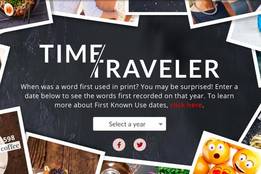In terms of vocabulary development, we were all little geniuses in childhood, learning hundreds of new words every year. By the time we entered first grade, most of us had active vocabularies of several thousand words.
Unfortunately, we weren’t geniuses for very long. By age 11 or 12, equipped with a sizable survival vocabulary, most of us lost some of our early enthusiasm for language, and the rate at which we picked up new words began to decline significantly. As adults, if we don’t make deliberate efforts to increase our vocabularies, we’re lucky to pick up even 50 or 60 new words a year.
The English language has so much to offer (between 500,000 and 1 million words, by most accounts) that it would be a shame to let our vocabulary-building talents go to waste. So here’s one way that we can regain some of our youthful brilliance: learn a new word each day.
Whether you’re a student preparing for the SAT, ACT, or GRE, or simply an unabashed logophile (or lover of words), starting each day with a fresh word can be intellectually nourishing—and more enjoyable than a bowl of All-Bran.
Here are three of our favorite daily word sites: all are free and available through e-mail subscriptions.
A.Word.A.Day (AWAD)
Founded in 1994, A.Word.A.Day at Wordsmith.org is the creation of Anu Garg, an India-born computer engineer who clearly enjoys sharing his pleasure in words. Simply designed, this popular site (nearly 400,000 subscribers from 170 countries) offers concise definitions and examples of words that relate to a different theme every week. The New York Times has called this «the most welcomed, most enduring piece of daily mass e-mail in cyberspace.» Recommended for all word lovers.
Oxford English Dictionary Word of the Day
For many of us, the Oxford English Dictionary is the ultimate reference work, and the OED Word of the Day provides a complete entry (including a wealth of illustrative sentences) from the 20-volume dictionary. You can sign up to have the OED’s Word of the Day delivered by e-mail or RSS web feed. Recommended for scholars, English majors, and logophiles.
Merriam-Webster’s Word of the Day
Less expansive than the OED site, the daily word page hosted by this U.S. dictionary-maker offers an audio pronunciation guide along with basic definitions and etymologies. The Merriam-Webster Word of the Day is also available as a podcast, which you can listen to on your computer or MP3 player. Recommended for high school and college students as well as advanced ESL students.
Other Daily Word Sites
These sites should also be useful to high school and college students.
- Dictionary.com Word of the Day
- The Learning Network (The New York Times)
- The Quotations Page Word of the Day
Of course, you don’t have to go online to learn new words. You can simply begin making a list of new words that you encounter in your reading and conversations. Then look up each word in a dictionary and write down the definition along with a sentence that illustrates how the word is used.
But if you need a little encouragement to work on building your vocabulary every day, sign up for one of our favorite word-a-day sites.

1. A.Word.A.Day (AWAD)
You can see the word of the day, and yesterday’s word of the day, on the website or through an email subscription. The website is strikingly simple, but highly useful. It provides the pronunciation, meaning, etymology, and usage of the selected word. Below the entry, the owner, Anu Garg, also presents a thought of the day. The New York Times commented that this website is “The most welcomed, most enduring piece of daily mass e-mail in cyberspace.” In fact, it has over a million subscribers from over 170 countries.
2. Merriam-Webster’s Word of the Day
One of the most respected dictionaries in the world, Merriam-Webster has a sophisticated layout for its word-of-the-day page. It provides a definition (with sound of the word spoken included), a “Did you know” section, examples of its usage, a “Name that synonym” section, podcasts, and a word of the day calendar at the bottom. Those who are truly interested in words and their histories, this dictionary will be a treat. Its “Did you know” section is expansive, and allows readers to understand the nuances of each selected word. On the left of the presentation is an easy way to share the word of the day through Facebook, Twitter, and Google Plus. You can even get the word of the day emailed to you through a subscription. It even has a section for learners called a learner’s dictionary. This dictionary also has a word-of-the-day category.
3. Wordnik
This website is all about words, with a word community, word of the day, and random word pages. On its word-of-the-day page, it has concise definitions of words with ample example sentences with the chosen word being used, extra notes on nuances, and also stats on its usage and even its Scrabble score. The fantastic thing about this page is that each word is accompanied with real examples from literature, not just sentences made up on the spot that sound unnatural. So, not only will you learn a new word each day, but also become knowledgeable in literature through this website. It also has an easy-to-access archive, and a convenient way of sharing words via social media.
4. Duolingo
This is perhaps the best language learning app and website out there. In turn, it is a great tool for learning new words. You can compete with your friends and family through the app, so you can gain that motivation needed to learn new words. It has a simple but pleasant layout, with many different exercises for learning: speaking, listening, writing, multiple choice questions, matching word exercises, and more. You can either strengthen what you already know, or venture into the world of new words each day. Duolingo focuses on obtaining a streak, so you know how many days in a row you have been learning a certain language (in our case, it is most likely English). There are many other language learning apps on the market, but it seems Duolingo takes the cake in terms of efficiency, user-friendliness, and motivation. It even has a cute owl mascot that cheers you on as you go through the exercises. I think that most people use the app rather than the website; however, both can be useful. It is important to download the necessary keyboards for the languages you are learning, though.
5. Dictionary.com’s Word of the Day
This is another popular option for learning new words easily. It shows the definitions in the form of a meme or picture you can conveniently share on social media (including showing the pronunciation and what kind of word it is). Below the definitions are citations of the word of the day’s usage from literature. Lastly, there is a section that discusses the origin of the word. You can sign up for an email subscription to the page, and seeing the visual archive of the word of the day for the previous day is just a scroll away.
6. Oxford Dictionary’s Word of the Day
Maybe the most trusted dictionary in the world, the Oxford Dictionary website also has a webpage that features a word of the day. For each entry, you have an audio pronunciation guide, a definition, the word’s origin, and an easy-to-share picture of the word with a pronunciation guide across social media. I like that the Oxford Dictionary focuses on archaic usages of words as well, as for wordaholics, these archaic definitions can be useful to know and interesting to understand. Like most sites of this nature, it also has an email subscription option. Another section of this website to check out if you have time is “Explore the English Language,” which has wordlists and word origin features.
7. New York Times’ Word of the Day
A standard in the news industry, it is also a fantastic tool for learning. The New York Times presents a word of the day daily, attached with a quiz. What is also useful is that it shows words in context of The New York Times itself. So, they will show how the word was used in news articles from the Times. Each entry has sections for definitions, examples of its usage in news articles, and a quiz at the bottom. After you finish the quiz, you will see a more detailed look into the chosen word, discussing its nuances. A great tool for learning more words, and more about them.
8. WordReference.com’s Word of the Day
The special thing about this website is that it offers two categories: basic word of the day, and intermediate word of the day. The basic word of the day is aimed at beginners and the intermediate word of the day is focused on people who have been learning English for some time. Though each category has entries that are filled with detail, there is a clear difference between basic and intermediate entries. In the basic section, entries have sections dedicated definitions, common uses, usage within pop culture, and a button that reads “see full definition,” which leads a user to an elaborated entry. For the intermediate entries, there are sections devoted to expanded definitions, example sentences, words most often used with the chosen entry, usage within pop culture, “did you know,” origins, and once again a “see full definition” button. This seems like the most comprehensive website for learning words and their background stories, so to say. You can get these definitions sent to you by email, and can also share them easily via Facebook and Twitter. You can scroll through entries as if you were on a common blogging site.
9. Vocabulary.com
This website tries its best to make learning new words enjoyable. It has word games to play, you can look up words, and it has word lists. They say if you start playing with language, you will learn it quickly. This website seems to take this approach. When learning is fun and flexible, words will be retained at a better rate. A great thing about its quizzes is that when you answer a question, it will describe the word in detail. The search option has examples sentences written by humans, not computers (it happens often it seems), examples sentences that are in touch with the real world of how English is being used, and claims to be the fastest-working dictionary. Its layout is user-friendly and intuitive. In the lists section, there are myriad lists focused on different subjects, ranging from baseball to movies. It is a highly enjoyable and engaging website for learning new words, and for studying English in general.
10. Word of the Day! App
For people who are crazy about checking other dictionaries for varying definitions, this is the app for them. This app features the following sources:
- Merriam-Webster
- Dictionary.com
- Oxford English Dictionary
- The Free Dictionary
- The Learning Network
- WordSpy
- Latin Word of the Day
- MedTerms
- Yahoo! Education
You can conveniently compare definitions, and discover the nuances of words you want to delve into. In addition, you can “star” and “favorite” certain definitions and words. These starred and favorited words can be shared with friends, and the app will also alert you when new words have been entered into its system. It’s a free app, so it is a catch for those who don’t want to spend to learn. The entries for the words have audio recordings of pronunciation, root meanings, examples sentences, and connotations of chosen words.
Words at Play
-
13 Unusually Long English WordsPulchritudinous and many more
-
Every Letter Is Silent, SometimesWhen each letter can be seen but not heard
-
‘Dunderhead’ and Other ‘Nicer’ Ways to Say StupidAs illustrated by some very smart pups
-
When Were Words First Used?Look up any year to find out
WORD OF THE DAY – JANUARY 2019
If improving your English Vocabulary is one of your resolutions for 2019, you are at the right place. Bookmark our site www.addicted2learn.com to read and learn a new word every day
Word of the Day: January 31
Infallible:
Adjective
Meaning: Incapable of making mistakes. Free from mistakes, defects, and failure
Usage: James will be leading the new project soon. His previous projects were infallible
January 30
Savant
Noun
Meaning: A scholar or scientist who is specialized in a particular subject.
Usage: My brother is a verbal savant, He speaks more than 20 languages.
January 29
Magnanimous:
Adjective
Meaning: Someone who is noble, generous, tolerant and forgiving
Usage: The team leader of the HR Department was chosen for the best employee award because he is considered to be magnanimous by many of them.
January 28
Prominence:
Noun
Meaning: the state or condition of being noticeable, famous, or widely known
Usage: justin rose to prominence when he was introduced by Usher.
January 27
Sumptuous
Adjective
Meaning: Something that looks splendid, lavish, luxurious and expensive.
Usage: The organizers arranged a sumptuous banquet for all the guests at the event.
January 26
Impropriety:
Noun
Meaning: 1. Unacceptable, improper, or undignified act.
2. Inappropriate use of words especially in speech or writing.
Usage: The doctor was arrested on the charge of sexual impropriety with a patient.
January 25
Supercilious:
Adjective
Meaning: Feeling or Behaving as if one is superior; haughty; arrogant
Usage: karen was being supercilious, bragging and boosting about his achievements.
January 24
Ingenious
Adjective
Meaning: Someone who is clever, original and skillful.
Usage: The HR team of our company is ingenious enough to recruit and hire the required positions.
January 23
Ubiquitous
Adjective
Meaning: Exist everywhere or seem to appear or present everywhere at the same time.
Usage: Smartphones today do everything to ease our lives and hence they are becoming increasingly ubiquitous.
January 22
tittle-tattle
Noun
Meaning: Gossip or chatter about other person’s private life, especially which is not true.
Usage: The men of virtue never engage themselves in tittle-tattle.
January 21
Affluence
Noun
Meaning: Abundance of material goods, property; Money; Wealth.
Usage: When Jack won the lottery, his sudden affluence caused many of his old friends to feel envious.
January 20
Alacrity
Noun
Meaning: Enthusiastic, Cheerful, and Eager willingness to do something.
Usage: Our students participated in the fancy dress competition with alacrity.
January 19
Predilection
Noun
Meaning: A special liking or fondness for something; partiality; preference.
Usage: His predilection for sports in the college made him a successful sports person.
January 18
Meddling
Noun
Meaning:
- Unnecessary interference or intrusion in others private matters. Intervene. Poke.
- 2. Handle something carelessly without approval.
Usage: Jeffrey said to Elena, “you don’t have any right meddling in my personal matter”.
January 17
Winsome
Adjective
Meaning: Lovable, adorable and charming as an innocent child.
Usage: The lecturer’s Winsome smile made the students comfortable in the classroom.
January 16
Plenitude
Noun
Meaning: Something which is full, plenty or great in abundance.
Usage: There is plenitude of employment in countries that are economically strong.
January 15
Aegis
Noun
Meaning: The Support, Sponsorship, backing or protection given by an individual, group or an organization.
Usage: The seminar followed by the workshop on sustainable development was conducted under the aegis of the central government.
January 14
Whiffler:
Noun
Meaning: Someone who vacillates, or frequently changes his opinions or views.
Usage: The Whiffler participant in the news debate was rebuked by everyone in the debate.
January 13
Beamish:
Adjective
Meaning: A person who is optimistic, and cheerful. Bright and Smiling.
Usage: A beamish child is cheerful and full of smiles.
January 12
Philology:
Noun
Meaning: The study of the historical development of language, literature, etc.
Usage: Taylor’s interest in English made him choose philology in American Poetry.
January 11
Pliable
Adjective
Meaning: Something that is easy to shape, mold or control.
Easily influenced or persuaded.
Usage: John wants a beautiful, pliable, honest wife.
Plastic becomes pliable when heated.
January 10
Parsimonious
Adjective
Meaning: A Person who is extremely careful about spending money. An extreme frugal, miser.
Usage: Jenny is so parsimonious that she only makes a list of essentials before she goes shopping.
January 9
Erudition:
Noun
Meaning: Scholarly Knowledge gained through extensive learning, research, and scholarship.
Usage: Our English Professor is a man of immense erudition to demonstrate the growth of the English language.
January 8
Gregarious:
Adjective
Meaning: A person who enjoys forming associations and socializing.
Usage: Emmy is popular and gregarious in her team.
A region usually adopts a lingua franca, or common language, when its inhabitants speak many different languages or dialects.
When people hear the term lingua franca, they often think of English. Although there are millions of people worldwide who don’t speak English, it has still become the lingua franca of many regions and areas of communication. One example is aviation — for airline pilots around the world, English is the lingua franca. The term means «Frankish tongue» in Italian, a reference to the original, 11th-century lingua franca, a mixture of Italian, French, Turkish, and other Mediterranean languages.
Want to expand your vocabulary?
Get Word of the Day delivered straight to your inbox!
Sign up now (it’s free!)
Whether you’re a teacher or a learner, Vocabulary.com can put you or your class on the path to systematic vocabulary improvement.
Get started
Finally, a dictionary with a soul

Our definitions were written by humans, for humans.
Each word has a friendly explanation that makes it easy to remember.
Real world examples

Discover thousands of example sentences from current newspapers,
magazines, and literature.
World’s smartest, fastest dictionary

Find the word you’re looking for faster than any other online dictionary.
That’s less time searching, more time learning.




























